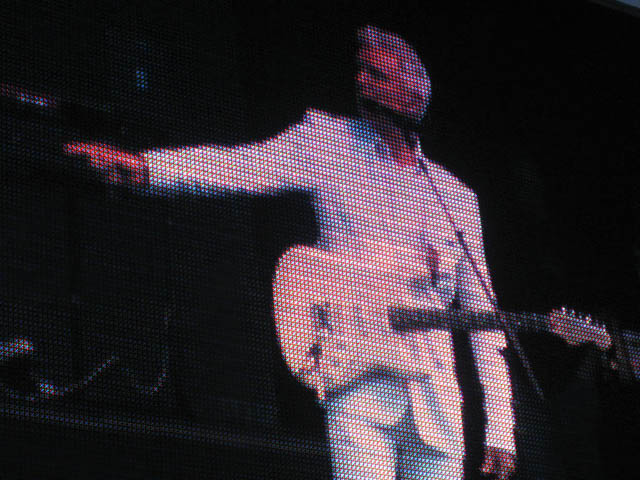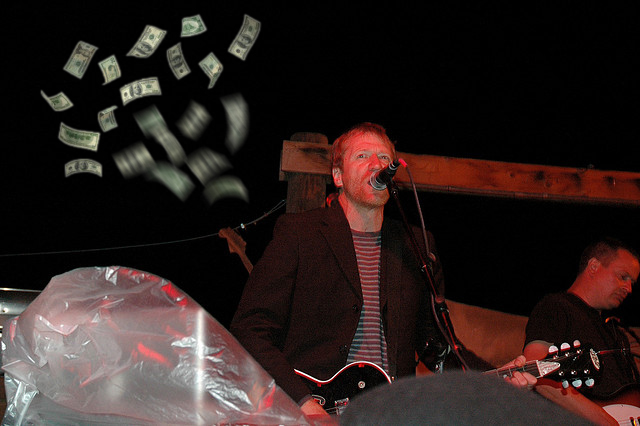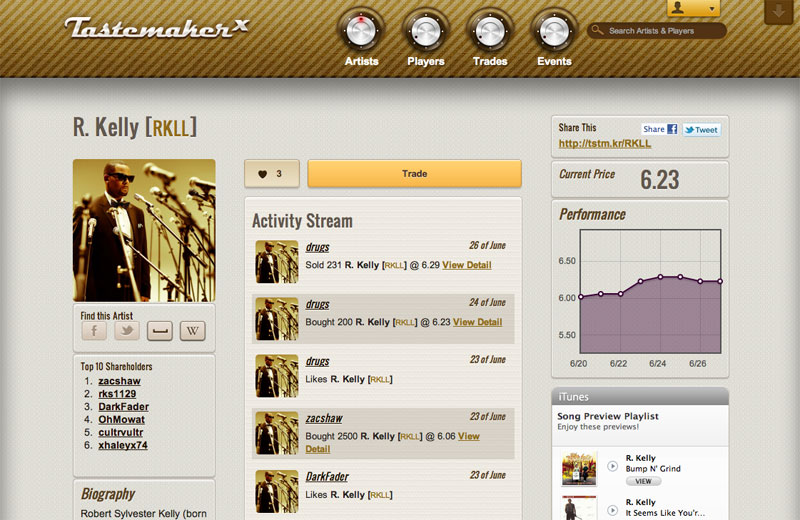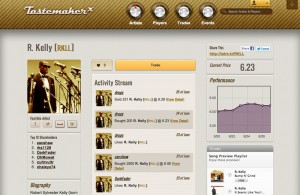
“It is difficult to get a man to understand something, when his salary depends upon his not understanding it!” – Upton Sinclair
It’s the latest fad: rock stars hating digital music. Well, not really — it started with Napster. Back then, a lot of artists held their tongues, realizing that it would be mega-uncool to call their fans thieves just for being fans. Plus, the major labels had screwed them repeatedly, and it was schadenfreude to see them suffer because of their own greed and ineptitude.
Flash forward over a decade, and the labels have figured out how to continue to profit from gatekeeping access to the world’s music. Sure, they’ve seen their market share slip versus the indies, and now only own the rights to around 70% of recorded music. But they’ve once again managed to control the means of mass distribution, this time by dictating the terms of digital music streaming services so that they could not exist without the majors, legal or financially. (I’s also the reason why streaming royalty payouts are so low for most artists — the major labels, as always, take the lion’s share.)
The rock stars realize they’re being screwed again by the majors (what did they expect?) David Byrne is the latest to pile on While many famous musicians point the finger at tech companies ad exploiters du jour, Byrne’s piece rightly acknowledges the majors are culpable for setting the terms of streaming music. Nonetheless, he speaks in concert with many other high profile artists when he blames digital distribution of music for destroying music, saying “The internet will suck all creative content out of the world”. I respect Byrne as a musician and a well-spoken, well-written, thoughtful musical provocateur, but this is too much.
Most of the complaining is just reactionary vitriol, the same way journalists deride blogging, or photographers bellyache about Instagram. There were probably some pretty pissed off monastic scribes when the printing press came out.
The problem with creative professionals complaining about changes brought about by technology is that they’re focusing only on their careers. I don’t blame ’em. Only those with a laser-like career focus can find any long-term success in the creative industries. As it relates specifically to the music industry, I never would have expected vaudeville performers to welcome recorded music, or for Tin Pan Alley to welcome radio, or for the record and radio busiensses to welcome digital.
When rock stars and professionals make the digital music debate all about their paychecks, they not only pass culpability from the major labels that deserve it to the technology companies that enable freer access to music. Tragically, when music professionals make grandiose statements about how digital is killing music, they measure the decline only in the dollar amount of their paycheck, and they denigrate music in the same way the major labels do. They reduce one of humankind’s greatest evolutionary and expressive triumphs to mere profit, and they fail to ignore the benefit of digital music to everyone else.
Put simply, more music is being made and listened to than ever before. Digital music combines the best of recording (accessibility to high-quality music performances) with the best of radio (free access). It’s the best thing to ever happen for fans — and make no mistake, fans control the music industry, though more often than not they may not realize it.
There is no doubt the professional musician is on the decline, which is bittersweet. Most career musicians are working-class survivors, a group of ~50,000 musicians in the U.S. who have fought their way tooth-and-nail to profitability. Only a fraction enjoy profitable careers lasting more than a few years. A generally non-vocal majority of professional musicians are busy adapting to the changing market, but a handful of very vocal complainers are raising an awful stink about their shrinking paychecks. Again, I don’t blame them for being protective of their livelihoods — but look what good paywalling did for newspapers/journalists. Successful pro photographers found out ways to embrace Instagram, not fight it.
My biggest gripe with the anti-free access to music, professional musician mentality is that what little time it spends focusing on solutions, those solutions belie any understanding of the change that has already taken place, and ignore those who aren’t professional musicians — namely, the tens of millions of music fans that make their paychecks possible.
It’s absurd how many artists, Byrne included, just complain. At least crusaders like David Lowery are trying to articulate solutions, though they often reduce to useless catch phrases like “stop artist exploitation” or “piracy is stealing”. What is all this doing except making professional musicians look like entitled, out-of-touch geezers to their fans?
The other troubling development is that these activist musicians end up bolstering the exploitation-based business built by major labels, by virtue of the fact that major labels control the market. Every dollar musicians fight to earn back by more strictly enforcing copyright law is $99 that goes into the pockets of the labels. Even the labels are finally realizing after 125 years of fighting piracy, that the War on Piracy is like the War on Drugs or the War on Terrorism. To the extent that battles can be won, the cost of doing so — both financial and in the hearts and minds of fans — is unsustainable.
What these money-focused musicians miss is so obvious: it’s not about the money. As Henry Rollins said, “I’d rather be heard than paid.” This is not something that only professional musicians feel. Every musician feels this. Even fans feel this. And I think what every professional musician needs to realize is that their careers are transforming because digital technology awakens the musician in all of us. Music professionals no longer enjoy a monopoly on the title of “musician.”
Free access to music empowers the amateur and the aspiring musician to earn income on scales that were not possible before. It reverses the trend of music without context — instead of digital files floating around in the cloud, creators are now compelled to create imagery, video, and other media around the music, enriching the fan experience.
Free access to music is blurring the line between fan and musician, creating a new culture of creator-consumers, remixing and mashing up several generations of recordings to create a new art form. They curate playlists to become the new DJs. They sample at will to electronically create entirely original compositions with embedded links to music history.
Free access to music rebalances the world of music more toward performances, away from the hegemony of the recording. In a post-scarcity economy, copies of performances lose value, original performances gain value. This rewards the generation of new music without having to rely on messy copyright law. EDM is explosively huge, and so much of it exists outside the copyright exploitation paradigm.
Free access to music allows musicians to focus on what’s really important: their relationship with their fans. Gone are the days when fans were measured in dollar amounts. Success in music is now measured in attention, in engagement.
Free access to music de-emphasizes the ethically compromised business model of copyright exploitation in favor of direct fan patronage. It may not scale to gold records, but the only people that seem to care are the rock stars, and those that still believe in the rock star myth. And if you’re hell-bent on copyright exploitation as your main source of revenue, there are plenty of academic studies showing free access to music increases sales of access to music.
I get that it’s counterintuitive — especially for professional musicians — to see their disappearing careers as a good thing. But it is. You just have to consider that music is bigger than the ~50,000 professional musicians in the U.S. There are fifty times as many musicians creating music right now for no money, and waving it all away as crappy music is a defense mechanism. They are finding their audiences. They are supplementing their income and breaking even. They are being heard even if they aren’t being paid. And if they’re really good composers, performers, recording artists and entrepreneurs, they are getting more chances to be heard, more chances to build a career.
There is no doubt that free access to music is inevitable — if not here already — and will continue to be the major force in reshaping music. To the detractors and complainers, I’m afraid the question of whether that’s a net benefit to humanity has already been settled. The fans have spoken. They want the music back.



 Writing has been heady and traffic has been heavy on the blog this week. I’ve been fully engaged in this David Lowery vs. Emily White debate as it goes viral.
Writing has been heady and traffic has been heavy on the blog this week. I’ve been fully engaged in this David Lowery vs. Emily White debate as it goes viral. 
 Note: This was posted as a response to David Lowery’s
Note: This was posted as a response to David Lowery’s